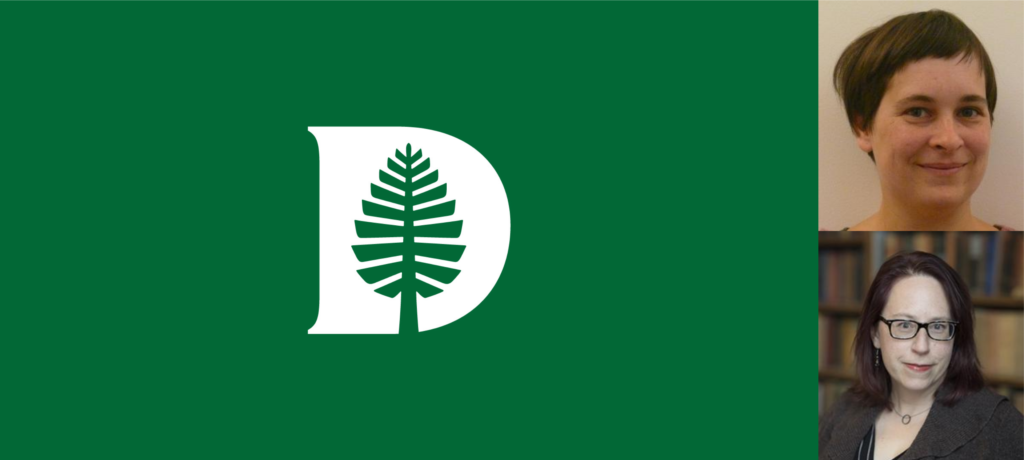Jennifer Mullins and Laura Braunstein of Dartmouth Library kindly took the time to answer questions from Sara Brumfield of FromThePage, and discussed their project and experience using the platform.
Jennifer Mullins is the Digital Lifecycle Librarian and Co-Lead of Digital by Dartmouth Library. Laura Braunstein is the Digital Humanities Librarian and Co-Lead of Digital by Dartmouth Library.
First, tell us about your documents.
“Collating Wrangel Island” is a collection of correspondence, manuscript drafts, photographs, contracts, and diaries from the Dartmouth Library’s Vilhjalmur Stefansson Collection on Polar Exploration. Wrangel Island is north of Siberia, a gateway to the northern portion of the Arctic Sea above the Bering Strait. This 2,900-square-mile expanse has been claimed at various times by Canada and Russia.
Wrangel Island never supported an Indigenous human population, but it was a refuge for polar explorers awaiting rescue. Others attempting to settle the island died, undone by their naiveté and hubris. These materials from the Stefansson Collection related to Wrangel’s history provide a rich backstory to elucidate political, social, economic, and environmental factors that shape our understanding of the Arctic.
The Dartmouth Library’s digital project, supported by a gift from the Gladys Krieble Delmas Foundation, and through support from the Alaska Library Network, “collates” manuscript materials from 1900 to 1930 in order to reveal the nuanced history of this contested space.
What are your goals for the project?
We are excited to involve students, researchers, and interested folks from the public in discovering and transcribing this material. By opening this project to crowdsourced transcription, we hope that the Dartmouth Library’s Wrangel Island collection, as well as our other digital collections, will reach greater audiences. We also see this collection as contributing to continuing research on the science, history, and culture of the Arctic from a variety of disciplinary approaches. We are also exploring how crowdsourcing can enhance the collaborative aspects of our current digitization workflows.
How are you recruiting or finding volunteers/collaborators?
We are beginning with our colleagues on the Dartmouth Library staff, many of whom have already found and transcribed some favorite documents! There is a spring term course in Environmental Studies at Dartmouth called “The Earth’s Cold Regions,” which considers the Arctic from scientific, environmental, social, and cultural perspectives, and we will reach out to those students. Through Dartmouth’s Institute of Arctic Studies, we hope to engage students, researchers, and members of the public in contributing to the project. And we hope that other members of the community, even if they are not professionally engaged in studying the history of Arctic exploration, will join us!
Can you share your experience using FromThePage?
We spent a long time experimenting with From the Page before launching our first project. We wanted to make sure we understood how to structure a project and how to get the output we needed in order to integrate transcriptions into our digital collections. We were fortunate to work with a fantastic intern, Colin Van Alstine, who had strong metadata skills to explore the From the Page platform and all of the settings. He collaborated with us to set up our project, as well as to write documentation for different stakeholders (transcribers, metadata librarians, project leads, etc). Sara and Ben have been fantastic with answering our questions, and we've attended a number of their webinar offerings as well. We finally made the project public a few weeks ago, and it's been really exciting to see people engage with the materials!
How does FromThePage & crowdsourcing fit within a college library?
Student engagement with original research – especially using primary sources – is at the heart of a liberal arts education. And the library is the center of campus. But many people who work in digitization programs don’t interact as directly with undergraduate students as our library colleagues in public services do. We see crowdsourced transcription as an opportunity for Digital by Dartmouth Library to become more deeply engaged with student learning – and with lifelong learning among our alumni communities. We’re also excited to participate in wider discussions in the library and archives professions about teaching and learning that is focused on digitized primary source collections.
What would you tell folks considering a similar project?
Start small, and keep an open mind!
Do you have engaging documents that could benefit from crowdsourced transcription? Book a call with Ben and Sara today.




